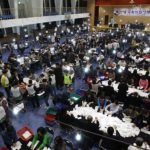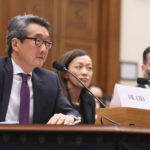November 13, 2017, by Marie DuMond—
Beyond Parallel’s first-ever survey of expert assessments on unification-related issues indicate South Korea and the United States share the common view that domestic stabilization and unification costs constitute the most critical unification blind spots with a high degree of concern but low levels of knowledge for both countries.
October 18, 2017, by Marie DuMond—
Domestic stabilization is the most critical issue with unification for South Korean officials and experts, registering the highest composite score (i.e., high level of concern and low level of knowledge). This means civil-military relations, law and order, and stability in the North represent the issues for which Koreans see great consequences for national interests, but for which they have little prior knowledge or understanding. Hence, it is the greatest potential “blind spot” of unification. Costs related to unification rank a close second for South Koreans, followed by refugees, nuclear weapons, and human rights.
October 2, 2017—
The debate over how to deal with North Korea’s nuclear program has been raging for nearly 25 years. In this study, CSIS Beyond Parallel collected information on negotiations between the U.S. and North Korea to shed light on the present nuclear dilemma.
September 6, 2017—
North Korea conducted its sixth nuclear test on September 3, 2017. North Korean state media announced that the test was of a hydrogen bomb that could fit on the top of an intercontinental ballistic missile (ICBM)... On September 3, North Korea conducted its sixth nuclear test. North Korean state media announced…
July 24, 2017, by Marie DuMond—
A View Inside North Korea: 35 of 36 North Koreans currently living inside North Korea said at least 75% of their household income came from the markets and not from their official government sanctioned jobs. As featured on The Washington Post... As featured in The Washington Post "Markets helping North Koreans become more independent of the…
April 18, 2017, by Victor Cha—
To study the relationship between North Korean provocations and South Korean elections, Beyond Parallel created a new database of events incorporating both presidential and national assembly elections from the Republic of Korea (ROK) over the last six decades.
March 17, 2017, by Andy Lim and Victor Cha—
Beyond Parallel created an original dataset of all high-level visits between the two countries from 1953 to the present to determine whether the number of high level visits over the last six decades could shed light on the current state of the relationship.
February 8, 2017, by Victor Cha—
A Testimony by Victor Cha before the U.S. House of Representatives Foreign Affairs Committee on February 7, 2017... A Testimony by Dr. Victor Cha before the U.S. House of Representatives Foreign Affairs Committee on February 7, 2017. Chairman Royce, Ranking Member Representative Engel and distinguished Members of the Committee, it is a distinct…
February 2, 2017, by Bridget Coggins—
Refugees, and the fate of civilians in general, are critical to planning in case of dramatic political instability in North Korea... Refugees, and the fate of civilians in general, are critical to planning in case of dramatic political instability in North Korea. Most concerning strategically is...
January 12, 2017, by Marie DuMond—
Information control is one of a significant list of the terrible human rights abuses by the North Korean regime, as it seeks to control the mind, expression, and thoughts of the citizens as a tool of repression... 91.6 percent of North Korean respondents consume foreign media at least once each month. 83…









